外研版八年级上册Module5导学案
初二上Module 5-导学案

四、理解意思小组间合作解决Activity 2中不懂的地方,教师适时点拨。
五、突破重点与难点(一)对重点内容和疑难问题进行合作探究学习。
1.Who’s it by? It’s by Strauss. 意思是“_______________________________”这里的by是介词,意思是“由……创作(编著、导演、作曲等)“。
例:这是莎士比亚写的一部戏剧。
It’s a play ________ Shakespeare.2.What’s it called? 意思是:______________________“be called”意思是“被叫”,“be+动词的过去分词”是被动语态谓语动词的构成。
例如:她叫Mary. She is called Mary.3. Give us a break!别再烦我们了(让我们清净一会儿吧!)当我们想要告诉对方不要再烦人了,就可以说Give sb. a break!别再烦我了。
______________________4. What on earth is that? 意思是”_________________________________”on earth常放在疑问词的后面,用以加强语气,表示“究竟,到底“。
造句:你到底是谁?___________________________________自主造句:__________________________________________5. 观察下列句子:a.You’ve heard of him, haven’t you?b. Jack was German, wasn’t he?c. She doesn’t like pop music, does she?当我们陈述一个事实,而又不是很有把握,就可以再陈述句后加一个简短问句,称为反意疑问句。
找出对话中所有的反意疑问句。
通过观察后大家发现:①反意疑问句的构成:前肯后______,前否后_________.②反意疑问句的主语必须是代替前面主语的代词。
Module5模块测试教学设计2024-2025学年英语外研版八年级上册

4.教室布置:根据教学需要,对教室进行布置。可以设置分组讨论区,供学生进行小组讨论和合作学习;设置实验操作台,供学生进行实验操作和观察。同时,确保教室内的座位安排合理,便于学生与老师之间的互动和交流。
1.讨论主题:学生将围绕“跨文化交流在实际生活中的应用”这一主题展开讨论。他们将被鼓励提出自己的观点和想法,并与其他小组成员进行交流。
2.引导与启发:在讨论过程中,我将作为一个引导者,帮助学生发现问题、分析问题并解决问题。我会提出一些开放性的问题来启发他们的思考。
3.成果分享:每个小组将选择一名代表来分享他们的讨论成果。这些成果将被记录在黑板上或投影仪上,以便全班都能看到。
重点题型整理
1.口语表达题
题型:根据所给情境,用本节课所学词汇和语法完成一段对话。
例题:你的朋友向你介绍他/她的家乡文化,你需要用本节课学到的表达方式向他/她提问。
答案:A: Hi, Jack! I hear you're from a beautiful city. Can you tell me something about it?
Module5模块测试教学设计2024-2025学年英语外研版八年级上册
学校
授课教师
课时
授课班级
授课地点
教具
课程基本信息
1.课程名称:英语Module 5测试教学
2.教学年级和班级:八年级1班
3.授课时间:2024-2025学年第一学期第15周星期三上午第2节
4.教学时数:45分钟
核心素养目标
1.语言能力:通过Module 5的测试教学,使学生能够熟练运用本模块所学词汇、语法和句型进行口头和书面表达。
外研版英语初二上册Module5Unit1《IwantedtoseetheBeijingOpera》
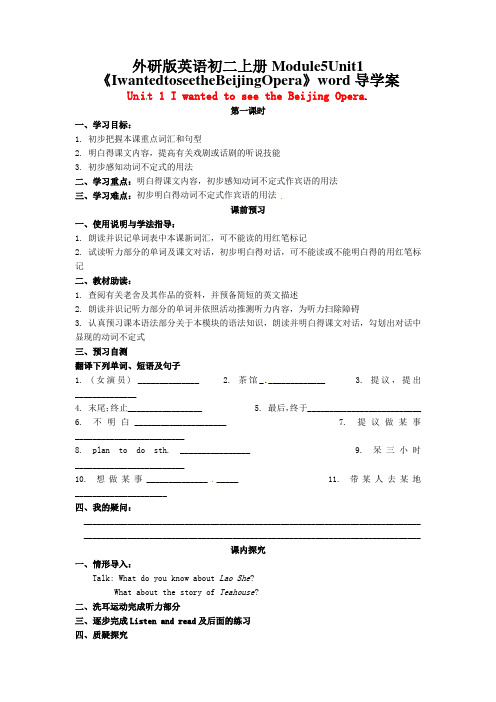
外研版英语初二上册Module5Unit1《IwantedtoseetheBeijingOpera》word导学案Unit 1 I wanted to see the Beijing Opera.第一课时一、学习目标:1. 初步把握本课重点词汇和句型2. 明白得课文内容,提高有关戏剧或话剧的听说技能3. 初步感知动词不定式的用法二、学习重点:明白得课文内容,初步感知动词不定式作宾语的用法三、学习难点:初步明白得动词不定式作宾语的用法课前预习一、使用说明与学法指导:1. 朗读并识记单词表中本课新词汇,可不能读的用红笔标记2. 试读听力部分的单词及课文对话,初步明白得对话,可不能读或不能明白得的用红笔标记二、教材助读:1. 查阅有关老舍及其作品的资料,并预备简短的英文描述2. 朗读并识记听力部分的单词并依照活动推测听力内容,为听力扫除障碍3. 认真预习课本语法部分关于本模块的语法知识,朗读并明白得课文对话,勾划出对话中显现的动词不定式三、预习自测翻译下列单词、短语及句子1. (女演员) ______________2. 茶馆______________3. 提议,提出______________4. 末尾;终止_________________5. 最后,终于__________________________6. 不明白_____________________7. 提议做某事_________________________8. plan to do sth. ________________ 9. 呆三小时_________________________10. 想做某事___________________ 11. 带某人去某地_____________________四、我的疑问:_____________________________________________________________________________ _____________________________________________________________________________课内探究一、情形导入:Talk: What do you know about Lao She?What about the story of Teahouse?二、洗耳运动完成听力部分三、逐步完成Listen and read及后面的练习四、质疑探究自读课文,并翻译、背诵下列重点句:1.---How was it?---It was great.2.Lingling of fered to take me there.3.It was difficult to understand the words.4.That’s the main thing.5.I hope to understand more next time.6.We only plan to watch for an hour.7.I wanted to see the Beijing Opera.[五、当堂检测Work in groups. Make dialogues talking about the opera Teahouse.六、课后反思__________________________________________________________________________________________________________________________________________________________课后训练依照首字母或中文意思写单词:1.Zhang Ziyi is a famous Chinese a_________________.o She’s T_____________________ is a well-known play in China.3.My father o_____________________ ( 主动提出 ) to take me to Beijing.4.I have no i________________ about the English test.5.In the e________________, we understood what he said.6.We want to see the Beijing O________________.课后学习指导:朗读对话并背诵,注意语音语调Un it 1 I wanted to see the Beijing Opera. 第二课时一、学习目标:1. 熟练把握本课重点词汇句型,并初步明白得动词不定式作宾语的用法2. 能听明白和明白得有关戏剧或话剧的话题,培养听说技能3. 能用动词不定式进行简单的对话二、学习重点:初步明白得动词不定式作宾语的用法三、学习难点:明白得并熟悉搭配动词不定式的动词课前预习一、使用说明与学法指导:1. 通过语音训练拓展日常交际用语2. 通过对话表演方式大胆开口,能用英语进行有关戏剧或话剧的交流3、观看对话总结接动词不定式作宾语的单词或结构二、教材助读:朗读并明白得语音部分的词句,注意结对反复练习句子重读三、预习自测(一) 小组合作练习Activity 5中的重读单词,相互纠正(二) 完成Activity 7并结对练习Activity 8部分,注意结合Activity5的知识反复练习四、我的疑问:_____________________________________________________________________________ _____________________________________________________________________________课内探究一、情形导入Work in pairs. Retell the main idea of the c onversation.二、按要求完成语音部分注意英语口语中的重读现象三、质疑探究知识要点探究1. The Beijing Opera is difficult to understand. 京剧专门难明白。
初二上册module5导学案
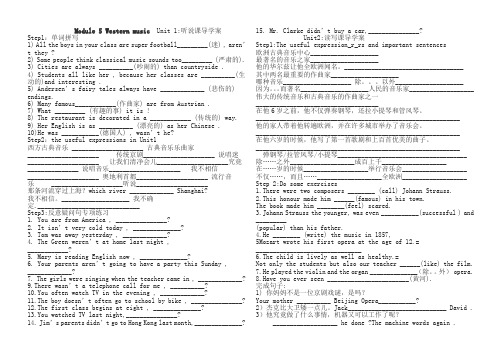
Module 5 Western music Unit 1:听说课导学案Step1:单词拼写1) All the boys in your class are super football_________(迷) , aren’t they ?2) Some people think classical music sounds too_________ (严肃的).3) Cities are always __________(吵闹的) than countryside .4) Students all like her , because her classes are __________(生动的)and interesting .5) Andersen’s fairy tales always have _____________ (悲伤的) endings.6) Many famous____________(作曲家) are from Austrian .7) What _________ (有趣的事) it is !8) The restaurant is decorated in a ____________ (传统的) way.9) Her English is as __________ (漂亮的) as her Chinese .10)He was ___________(德国人) , wasn’t he?Step2:the useful expressions in Unit1西方古典音乐 _____________________ 古典音乐乐曲家_____________________ 传统京剧_____________________ 说唱迷_____________________ 让我们清净会儿_____________________究竟_______________ 说唱音乐_____________________ 我不相信_____________________ 奥地利首都_____________________ 流行音乐 _____________________听说_____________________那条河流穿过上海?which river _____________ Shanghai?我不相信。
外研版八年级上册Module5Unit2教案
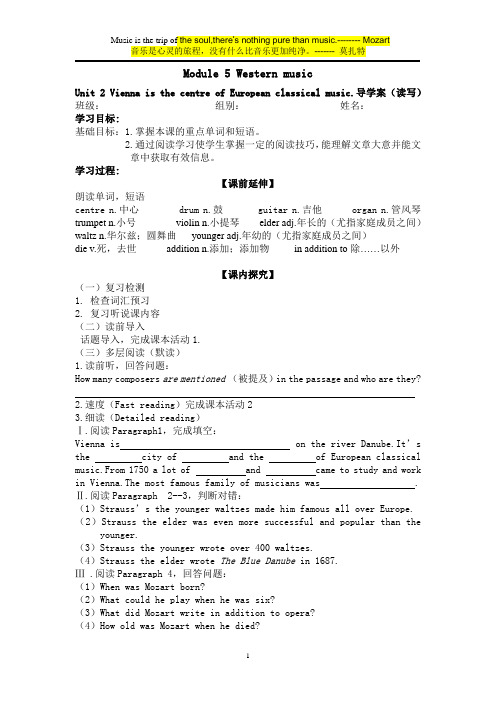
Module 5 Western musicUnit 2 Vienna is the centre of European classical music.导学案(读写)班级:组别:姓名:学习目标:基础目标:1.掌握本课的重点单词和短语。
2.通过阅读学习使学生掌握一定的阅读技巧,能理解文章大意并能文章中获取有效信息。
学习过程:【课前延伸】朗读单词,短语centre n.中心 drum n.鼓 guitar n.吉他 organ n.管风琴trumpet n.小号violin n.小提琴elder adj.年长的(尤指家庭成员之间)waltz n.华尔兹;圆舞曲younger adj.年幼的(尤指家庭成员之间)die v.死,去世addition n.添加;添加物in addition to除……以外【课内探究】(一)复习检测1.检查词汇预习2.复习听说课内容(二)读前导入话题导入,完成课本活动1.(三)多层阅读(默读)1.读前听,回答问题:How many composers are mentioned(被提及)in the passage and who are they?2.速度(Fast reading)完成课本活动23.细读(Detailed reading)Ⅰ.阅读Paragraph1,完成填空:Vienna is on the river Danube.It’s the city of and the of European classical music.From 1750 a lot of and came to study and work in Vienna.The most famous family of musicians was . Ⅱ.阅读Paragraph 2--3,判断对错:(1)Strauss’s the younger waltzes made him famous all over Europe. (2)Strauss the elder was even more successful and popular than the younger.(3)Strauss the younger wrote over 400 waltzes.(4)Strauss the elder wrote The Blue Danube in 1687.Ⅲ .阅读Paragraph 4,回答问题:(1)When was Mozart born?(2)What could he play when he was six?(3)What did Mozart write in addition to opera?(4)How old was Mozart when he died?(5)Who do some people say was the greatest European composer?(四) 精讲点拨Ⅰ.Find out the sentences in the passage which have the same meaning.1.He is famous all over the Europe for his waltzes.2.When he was 12, he worte his first opera.3.There were two composers. We call them Johann Strauss: a father anda son.4.He played the piano, the violin and the organ.Ⅱ.Language Points:1. His waltzes made him famous all over Europe.make + n + adj. 使……怎么样这部电影使他兴奋。
2024-2025学年外研版初中英语八年级(上)教案Module5Unit1
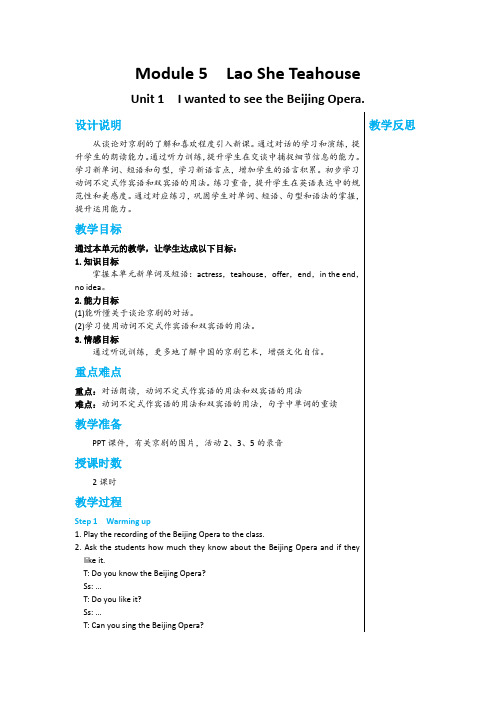
Module 5Lao She TeahouseUnit 1I wanted to see the Beijing Opera.设计说明教学反思从谈论对京剧的了解和喜欢程度引入新课。
通过对话的学习和演练,提升学生的朗读能力。
通过听力训练,提升学生在交谈中捕捉细节信息的能力。
学习新单词、短语和句型,学习新语言点,增加学生的语言积累。
初步学习动词不定式作宾语和双宾语的用法。
练习重音,提升学生在英语表达中的规范性和美感度。
通过对应练习,巩固学生对单词、短语、句型和语法的掌握,提升运用能力。
教学目标通过本单元的教学,让学生达成以下目标:1.知识目标掌握本单元新单词及短语:actress,teahouse,offer,end,in the end,no idea。
2.能力目标(1)能听懂关于谈论京剧的对话。
(2)学习使用动词不定式作宾语和双宾语的用法。
3.情感目标通过听说训练,更多地了解中国的京剧艺术,增强文化自信。
重点难点重点:对话朗读,动词不定式作宾语的用法和双宾语的用法难点:动词不定式作宾语的用法和双宾语的用法,句子中单词的重读教学准备PPT课件,有关京剧的图片,活动2、3、5的录音授课时数2课时教学过程Step 1Warming up1. Play the recording of the Beijing Opera to the class.2. Ask the students how much they know about the Beijing Opera and if theylike it.T: Do you know the Beijing Opera?Ss: …T: Do you like it?Ss: …T: Can you sing the Beijing Opera?Ss: …Step 2PresentationWork in pairs. Look at the pictures and talk about them. Use the words in the box to help you. (Activity 1 on Page 34)1. Ask the students to look at the pictures.2. Tell them to read through the words and make sure they know the meaningactress dance music play sing teahouse theatre traditional3. Ask them to describe the pictures in pairs.4. Encourage some pairs to present their conversations.Step 3Listening1. Let the students listen and underline the correct words or expressions. (Activity 2 on Page 34)(1) Ask the students to read the three sentences.(2) Play the recording and ask the students to choose the correct answers.(3) Have the students check answers with their partners.(4) Check answers and read full sentences with the students.Answers: 1 wants to see 2 doesn’t know 3 difficult(5) Play the recording again. Show the tapescript if necessary.Step 4Listening and reading1. Introduce the playwright Lao She and his play Teahouse to the class.2. Play the recording and ask the students to check the true sentences. (Activity3 on P35)(1) Read through the sentences and try to understand them.(2) Listen to the recording. Then check the true sentences.(3) Elicit the answers from the class.Answers: 3√4√5√3. Listen again and try to get answers to the question.1. Who went to Lao She Teahouse last night?2. Did Betty like the Beijing Opera?3. How long did they stay there in the end?4. Does Lingling often go to see the Beijing Opera?5. What is Lao She famous for?(1) Ask the students to read through the sentences and try to understand them.(2) Listen to the recording and try to get the answers. Allow some students toread the conversation if they still can’t get the answers after listening.(3) Elicit answers in full sentences for the class.Answers:1 Lingling and Betty.2 Yes, she did.3 They stayed there for three hours.4 No, she doesn’t.5 He is famous for his play Teahouse.4. Read the conversation again and find out the following phrases. Try to5. Listen to the conversation and read it.(1) Ask the students to listen to the recording and then try to read the conversation on their own.(2) Ask or encourage some students to read the conversation. Correct their mistakes.(3) Ask some students to practice the conversation in different roles.Step 5PracticeComplete the passage with the correct form of the words in the box. (Activity 4 on Page 35)(1) Read through the words in the box.complete it with the correct form of the words in the box on their own.(3) Check answers in groups.(4) Elicit answers from the class.Answers:(1) offered (2) difficult(3) actresses (4) end (5) mainStep 6Language points1. You know,I wanted to see the Beijing Opera,so Lingling offered to take me there. 你知道,我想看京剧,因此玲玲主动提出带我去那儿。
外研版八年级英语上册教案 Moddule 5 Unit 3-2

Module 5 Lao She TeahouseUnit 3 Language in use 2一、教学目标1. 熟练掌握下列词汇和短语:audience, survive, take place等。
2. 掌握本模块的重点句型。
3. 能够了解西方剧院的起源,读懂介绍古希腊剧院概况的文章。
4. 能够选一部戏剧中的一幕改编成短剧并表演。
二、教学重点及难点重点:1. 掌握本单元的单词、短语、句型及语法。
2. 能够了解西方剧院的起源,读懂介绍古希腊剧院概况的文章。
难点:选一部戏剧中的一幕改编成短剧并表演。
三、教学准备1. 多媒体设备和课件;2. 设计课后巩固练习;3. 教学图片。
四、教学过程Step 1 RevisionPractise and review the grammar.【设计意图】通过练习检测学生对于本模块语法的掌握情况。
Step 2 Warming-up1. Look at the pictures and talk about them.2. Look at the picture and learn something about it.【设计意图】通过展示世界著名剧院的形式引入本课,拓宽学生的眼界,吸引学生的注意力,并拓展课外知识。
Step 3 PracticeAround the world1. Ask Ss to read the passage and answer the questions.2. T checks the answers with the whole class.【设计意图】帮助学生了解西方剧院的起源和古希腊剧院的概况,扩大知识面,加强跨文化交际的能力。
3. Let Ss do some exercises to consolidate what they have learned.(1) Choose the correct answer.(2) Complete the sentences with the correct form of the words. 【设计意图】通过练习巩固本课所学知识,考查学生对知识的掌握程度。
季外研版英语八年级上册Module5知识点学案(无答案)

1. offer v.提议;提出【学以致用】The little boy ______ his seat to an old lady on the crowded bus.A. lentB. offeredC. tookD. brought2. in the end 最后;终于【自主归纳】end作名词,意为“(时间的)最后一段,末尾”。
常用短语有:in the end “最后; 终于”, 相当于at last和finally, 只表示时间概念一.用所给词的适当形式填空1. show v.展示;显示n.演出;表演课后练兵选择填空make sb. do sth. 让某人做某事一.用所给词的适当形式填空It is kind of you to help me a lot.( )1. It’s a good idea ___________ morning exercises every day.A. to doB. doingC. do( )2. He works very hard without _____________ a rest.A. stopping havingB. stops to haveC. stopping to have( )3. He asked me _____ the picture of the wall .A. put upB. to put upC. putting up( )4. I saw her _____________ when I came in.A. cryB. to cryC. crying( )5. ---Have you finished _____________ the book?---Not yet. I’ll try _________ it to you before Friday.A. reading, returningB. to read, to returnC. reading, to return( )6. Miss Zhu is popular with her students. She does what she can __________ them improve their English.A. helpB. to helpC. helping( )7. I hear someone ________ on the door. Please go and see who it is.A. knockB. knockingC. to knock( )8. What about _________ in the sea?A. go swimmingB. to go swimmingC. going swimming( )9. Mr Zhang teaches his Japanese friends _________ Chinese food.A. cookB. cooksC. to cook( )10. They _______ go out, because it rained hard.A. decide not toB. decides not toC. decided not to综合练习单项选择题()1. --How’s Bob now? --I hear the company _____ him a very good job.A.donatedB.servedC.offeredD.introduced()2. --How fun the Croods is! --Yeah! I like the movie, too. It’s so ______.A.boringB.scaryC.interestingD.sad()3. I like places where the weather is always warm. I hope ______ Hawaii this winter.。
Module5Unit1教案-外研版八年级上册英语
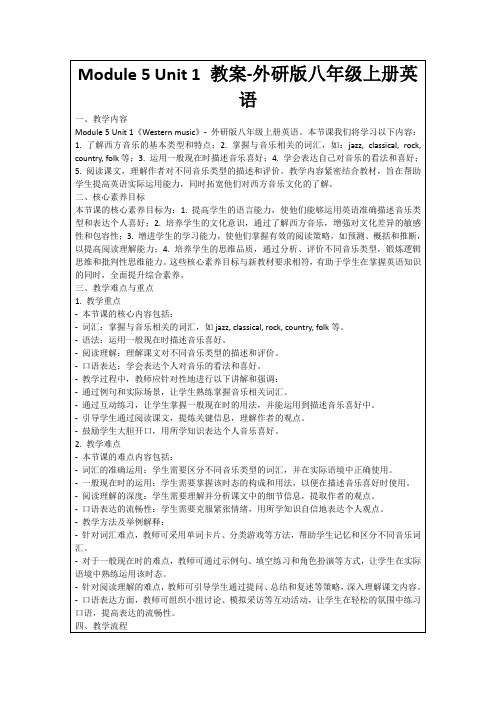
一、教学内容
Module 5 Unit 1《Western music》-外研版八年级上册英语。本节课我们将学习以下内容:1.了解西方音乐的基本类型和特点;2.掌握与音乐相关的词汇,如:jazz, classical, rock, country, folk等;3.运用一般现在时描述音乐喜好;4.学会表达自己对音乐的看法和喜好;5.阅读课文,理解作者对不同音乐类型的描述和评价。教学内容紧密结合教材,旨在帮助学生提高英语实际运用能力,同时拓宽他们对西方音乐文化的了解。
3.成果分享:每个小组将选择一名代表来分享他们的讨论成果。
(五)总结回顾(用时5分钟)
今天的学习,我们了解了西方音乐的基本概念、类型和表达个人喜好的方法。同时,通过实践活动和小组讨论加深了对音乐文化的理解。我希望大家能够掌握这些知识点,并在日常生活中灵活运用。最后,如果有任何疑问或不明白的地方,请随时向我提问。
-对于一般现在时的难点,教师可通过示例句、填空练习和角色扮演等方式,让学生在实际语境中熟练运用该时态。
-针对阅读理解的难点,教师可引导学生通过提问、总结和复述等策略,深入理解课文内容。
-口语表达方面,教师可组织小组讨论、模拟采访等互动活动,让学生在轻松的氛围中练习口语,提高表达的流畅性。
四、教学流程
三、教学难点与重点
1.教学重点
-本节课的核心内容包括:
-词汇:掌握与音乐相关的词汇,如jazz, classical, rock, country, folk等。
-语法:运用一般现在时描述音乐喜好。
-阅读理解:理解课文对不同音乐类型的描述和评价。
-口语表达:学会表达个人对音乐的看法和喜好。
-教学过程中,教师应针对性地进行以下讲解和强调:
外研版八年级英语上册导学案Module 5 Unit 1
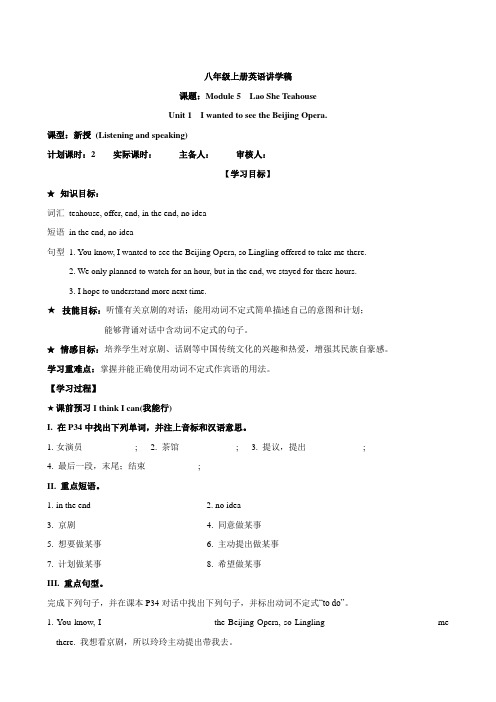
八年级上册英语讲学稿课题:Module 5 Lao She TeahouseUnit 1 I wanted to see the Beijing Opera.课型:新授(Listening and speaking)计划课时:2 实际课时:主备人:审核人:【学习目标】★知识目标:词汇teahouse, offer, end, in the end, no idea短语in the end, no idea句型 1. You know, I wanted to see the Beijing Opera, so Lingling offered to take me there.2. We only planned to watch for an hour, but in the end, we stayed for there hours.3. I hope to understand more next time.★技能目标:听懂有关京剧的对话;能用动词不定式简单描述自己的意图和计划;能够背诵对话中含动词不定式的句子。
★情感目标:培养学生对京剧、话剧等中国传统文化的兴趣和热爱,增强其民族自豪感。
学习重难点:掌握并能正确使用动词不定式作宾语的用法。
【学习过程】★课前预习I think I can(我能行)I. 在P34中找出下列单词,并注上音标和汉语意思。
1.女演员___________;2. 茶馆____________;3. 提议,提出____________;4. 最后一段,末尾;结束___________;II. 重点短语。
1.in the end __________________2. no idea ____________________3. 京剧____________________4. 同意做某事____________________5. 想要做某事_________________6. 主动提出做某事________________7. 计划做某事___________________ 8. 希望做某事____________________III. 重点句型。
外研版八年级英语上课件 Module 5 教案

Module 5 Lao She Teahouse【教材分析】本模块以老舍为主题,介绍了作家老舍、老舍茶馆以及话剧《茶馆》等相关内容,让学生了解这位在中国文坛中有着重要影响的作家。
本模块还通过听、说、读、写等一系列活动,让学生感知动词不定式的用法,并为他们提供充足的语言实际运用机会。
本模块的任务活动是通过小组合作,把一部戏剧中的一幕改编成短剧并加以表演。
在实施该环节的过程中,要求学生能够具有合作精神,积极地与他人合作,共同完成学习任务。
一、学习目标:A. 单词和短语:actress, teahouse, offer, end, in the end, no idea, act, show, common, describe, society, head teacher, college, novel, if, magicB. 交际用语:1. How was it?2. You know, …3. That’s the main thing.4. No idea.5. — Do you want to see the Beijing opera?—Yes, I’d love to.6. — Do you want to come to Lao She Teahouse with me?—Yes, please. I’d like to go with you.7. I wanted to see the Beijing Opera.8. Lingling offered to take me there.9. We only planned to watch for an hour.10. We decided to stay for three hours.11. I hope to understand more next time.12. — I want to see the Beijing Opera.—Why don’t we …?二、教学目标1. Function: Talking about intentions and plans.2. Structure: Infinitive structures (1): infinitives as objects; verbs followed by infinitives.3. Skills:1) Listening and understanding familiar topics (Beijing Opera) finding specific information.2) Describing intentions and plans in simple language.3) Reading and understanding the sequence of events.4) Writing a short passage about favourite play or film.4. Around the world: Theatres5. Task: Acting out a scene from a play.三、重点及难点:Infinitive structures (1): infinitives as objects; verbs followed by infinitives.四、教学设计:Unit 1 I wanted to see the Beijing Opera.【单元内容分析】Unit 1以培养学生的听说能力为主,第一单元里,以播放音频的形式,对学生下一步听力练习输入必要的词汇,并通过话前的问题帮助学生在听时关注相关信息,了解背景,激活头脑中相关的信息来帮助了解内容,同时培养正确的方法。
Module5LaoSheTeahouse单元整体教学设计八年级上册

The introdution of Teahouse, Lao She and
Lao She Teahouse 四
The introdution of Lao She 五
The introdution of Lu Xun
对话(听)
往老舍观看京剧;(2)两人一组合作对话询问彼此想要去做的事情;(3)介绍著名作家老舍、其作品
《茶馆》和北京老舍茶馆;(4)学习动词不定式作宾语的用法;(5)写一篇关于自己最喜欢的话剧或
者电影的作文;(6)练习巩固动词不定式作宾语的用法;(7) 关于西方古希腊剧院起源的介绍;(8) 挑
选一部戏剧中的一幕,并加以表演。
学情分析
(一) 自然情况 本单元围绕“老舍以及老舍茶馆”这一话题,开展教学活动,学习介绍中国国粹、名人和名著,符合 Module 5 Lao She Teahouse 这个话题的内容探究,以及八年级学生对中国文化知识的汲取需求。 (二) 已有基础
学生在小学阶段已经学会了关于自己意图和计划的表达,也有接触中国传统文化的学习。对于自己想要做 的事情和介绍自己喜欢的戏剧或电影等,学生都能或多或少地做介绍。 (三) 存在问题 学生对于中国国粹了解不够,词汇量也相对不足。利用学生对自己想要做的事情和自己喜欢的戏剧或电影 的兴趣,通过词汇的学习以及阅读技能的巩固,帮助学生更充分地掌握本模块的单词与句子,并准确地表 达自己的意图和计划,从而更加轻松地介绍自己喜欢的戏剧或电影,提升学生积极向上的情感,培养学生 对中国传统文化的热爱。 (四) 解决措施
行多方位评价。
单元学习目标
语言能力:用所学语言表达自己的意图或者计划;介绍自己喜欢的戏剧或电影;
外研版八年级上册英语导学案:M5U3

外研版八年级上册英语导学案:M5U3八年级英语上册导学案课题Module5 Unit 3 Language in use课型Revision and application【学习目标】(1)能够准确的使用本模块词汇(2)熟练掌握不定式作宾语补足语的句型结构,能够听懂并从中获得有效信息。
【学习重点和难点】学习本模块单词和短语;不定式作宾语补足语和目的状语的用法。
【学习方法】小组合作、交流讨论【Learning process】ⅠPreview1. I'm brilliant, and I can write the words according to phonetic symbols。
(Believing in yourself, you can do it.)1 [d??sa?d]2 [?d?va?s]3 [??f?(r)]4 [w?nt]2. Preview the text and find the following phrases from the text.(It's difficult, so remember to communicate!)1. 去茶馆_________________2. 起初,开始________________3. 思考,认为_______________4. Be different from ___________________5. at the same time _______________6. translate… into… _______________ⅡCooperative learning【Pre-revision】Read the sentences in the box.Go over the grammar points.(Page 126,127)【While-revision】1. Review the infinitive and the text. Complete the grammar practice. (Activity1-4)2. Listen and choose the correct answer. (Activity5)3. Listen again and check(√)the true sentences. (Activit y6)4.Work in pairs. T alk about your plans. Use the words and expressions in the box to help you.(Activity7)【Post-revision】1.Group exercise. Read the passage in Activity8 and find out the answers.(1)You would find the passage in ___________.a) a book b) a school newspaper c) a magazine(2) The writer _____________.a) liked the play b) did not like the play c) did not say he liked the play or not(3) The actors and actresses in the play wore __________.a) the same clothes as today b)their best clothes c) clothes of the first half of the twentieth century2. Work in groups. Find a play. Think about these questions.(Activity9)1. Where does it take place?2. Who is in it?3. What is the story?4. What are the special moments in it?3. Choose a scene and practice it. And act out the scene in front of the class. (Activity10 –11))【Post-revision】1.Ask students to read Around the world first. Make sure theyunderstand the meaning of the passage.2.Work in groups. Find a play. Think about these questions.⑴Where does it take place?⑵Who is in it?⑶What is the story about?⑷What are the special moments in it?3.Writing.写法指导:介绍一个故事情节⑴故事都是记叙已发生的事情,一般过去时是写故事最常用的时态。
Module5Unit1IwantedtoseetheBeijingOpera教案2023-2024

外研版八年级上册Module5Unit 1 I wanted to see the BeijingOpera教案Objective:➢Students will be able to understand and use vocabulary related to traditional Chinese performing arts.➢Students will learn about the Beijing Opera and its cultural significance.➢Students will practice expressing past desires and regrets using the past simple tense.Materials:✓Textbook: Module 5, Unit 1 "I Wanted to See the Beijing Opera."✓Visual Aids: Pictures and videos of the Beijing Opera performances.✓Whiteboard and Markers.✓Handout: Worksheets with vocabulary exercises.✓Audio Clip: A recording featuring dialogues related to expressing desires in the past.Introduction :(1)Begin with a discussion on traditional performing arts, askingstudents if they have any knowledge or experiences with such art forms.(2)Introduce the concept of the Beijing Opera and its culturalsignificance in China.(3)Show pictures and videos to provide a visual understanding of theBeijing Opera.Vocabulary Building :1)Present key vocabulary related to the Beijing Opera and traditionalperforming arts.2)Discuss pronunciation and meanings of the new words.3)Use the whiteboard to list the vocabulary and create sentences usingthe words.Listening and Speaking Activity:(1)Play an audio clip featuring dialogues expressing past desires andregrets.(2)Discuss the content and ask students to share their own experiencesof wanting to see a performance or event.(3)Conduct pair or group discussions where students use the pastsimple tense to talk about things they wanted to do in the past. Reading prehension :1)Have students read the dialogue in the textbook related to the desireto see the Beijing Opera.2)Discuss prehension questions as a class.3)Assign additional reading passages or articles about the BeijingOpera for homework, encouraging students to learn more about its history and elements.Writing Activity :(1)Provide a writing task where students pose short paragraphsexpressing a past desire or regret using the past simple tense.(2)Encourage creativity and detailed descriptions in their writing.(3)Peer review and discuss the written paragraphs in class. RolePlaying Activity:1)Divide the class into pairs and assign roles related to expressing pastdesires.2)Each pair creates a short dialogue incorporating the new vocabularyand the past simple tense.3)Groups perform their dialogues for the class.Cultural Exploration :(1)Discuss the cultural aspects of the Beijing Opera, including its history,costumes, and performance styles.(2)Show short video clips of Beijing Opera performances to enhanceunderstanding.(3)Encourage students to ask questions and express their thoughts onthe cultural significance of traditional Chinese performing arts. Conclusion and Homework Assignment:✧Summarize the key concepts learned in the lesson.✧Assign homework: Students write a reflection on what they learnedabout the Beijing Opera and its importance in Chinese culture.。
外研英语八年级上教案Module5全模块

外研版英语八年级上Module 5 Western music全模块教案Ⅱ. Teaching materials analyzing 教材分析本模块以Western music为话题,设计了三个部分的内容。
旨在通过模块教案使学生了解西方音乐的有关知识;了解奥地利著名作曲家——约翰·施特劳斯;学会表述反意疑问句及其回答;能谈论对不同类型的音乐及对于音乐的爱好和理解;谈论最喜欢的音乐;练习通过阅读找出信息的能力;能根据所给的信息写音乐家的传记。
Unit 1 谈论不同类型的音乐,学习能描述音乐的一些形容词;认识反意疑问句及其回答;谈论对音乐的喜好。
Unit 2 学习关于著名音乐家约翰·施特劳斯和莫扎特的文章,并从文章中找出细节信息;利用所个的信息写音乐家的小传。
Unit 3 在练习中复现本单元重点词汇、句型和语法;读关于the orchestra的文章;谈论并描述最喜欢的音乐。
III.Class types and periods 课型设计与课时分配Period 1Listening and speaking(Unit 1)Period 2Reading and writing(Unit 2)Period 3 Language in use (Unit 3)Ⅳ Teaching plans for each period分课时教案Period 1Listening and speakingTarget language 目标语言1. Words & phrases生词和短语pop, techno, beautiful, fun, lively, sad, serious, slow, traditional, sure, Austrian, composer, fan, on earth, noise2. Key sentences重点句子Who’s it by?You’ve heard of him, haven’t you?He was German, wasn’t he?You like western classical music, don’t you?But Sally is a classical musician, so she doesn’t like pop music, does she?No, she doesn’t.What on earth is that?Ability goals 能力目标Enable students to listen to different types of music and learn tag questions.Teaching important/difficult points 教案重难点Learn to talk about different types music and tag questions.Teaching aids教具准备A projector or some pictures and a tape recorder.Teaching procedures and ways教案过程与方式Step I Lead-inIn this procedure, show some pictures tolet the students know different types of music.T: Hello. Boys and girls. Nice to see you again.S: Nice to see you.T: Do you like music?S: Yes.T: There are many different kinds of music. What kind do you know?Learn new words of music types with the students. Ask students to read the new words: blues, classical, jazz, opera, pop, rock, techno, make sure they know the meaning of each word.T: We can use some adjectives to describe different kinds of music. For example, how is pop music?Help the students to say modern.T: OK. Next please work in pairs, and ask and answer questions about your favourite types of music and describe it.Sampleconversation:S1: What kind of music do you like?S2: I like blues.S1: How is blues?S2: It is sad.Help students learn the words dramatic, lively, slow, serious.Ask some pairs to make up a short conversation in front of the class.Step II Listening and matchingIn this procedure, ask students to listen to the tape and match different types of music and theadjectives. Help students learn and remember the new words.T: There are many different kinds of music and we can use many adjectives to describe them. Now, let’s look at the picture on page 34. Listen to the tape and decide which type of musicthe people in the photo play.Play the recording and check the answers. Then ask students to listen again and match the words with the music.Check the answers with students.Step III Listening and readingListeningIn this procedure, students will listen to and read a dialogue. Ask students to do pair work to find the people and the types of music they like. Learn some words in real situations.T: In these types of music, there is western classical music, do you like it?S: Yes.T: Sally’s school orchestra is playing western classical music. At the same time, Tony, Lingling, Betty, Daming are talking about their favourite types of music. Let’s listen.Ask students to listen to the tape and fill in the blanks of Activity 4.Go through the answers with the students.ReadingIn this procedure, ask the students to read the dialogue again and find some details. Do Activity 5 as a competitionto see if the sentences are true or false.T: Read the dialogue again and do Activity 5. Check if they are true or false. Let’s have a competition between boys and girls. If a boy or a girl first stands up and correct the question correctly, he / she will get a star. Those who get more stars will be the winner. Sampleconversation:S1: They’re listening to western classical music.S2: True.S1: Strauss was born in the capital of Australia.S2: False. Strauss was born in the capital of Austrian.Add another three sentences for the students to decide. Show the following.The music Tony is listening is by Strauss.Sally doesn’t like pop music.Daming likes rap music.At the same time, help students find out some difficult points. Deal with them together. Give students some other examples to make them understand further.In the end, count the numbers of stars with the whole students to see which side is the winner.Step IV DiscussionIn this procedure, practice some words and expressions in Activity 5 by having a discussion.T: There are some new words in the dialogue. Let’s read these new words and try to remember them.Show the following.capital, composer, fan, musician, riverT: Work in pairs. Ask and answer questions in Activity 6.Sampleconversation:S1: What’ s the capital of ShandongProvince?S2: Jinan.S1: Who is your favourite composer?S2: My favourite composer is Beethoven.…Check the answers. Ask some pairs to make up a short conversation. .Step V Pronunciation and speakingPronunciationIn this procedure, ask students to listen to the tape and pay attention to the tone of tag questions. T: In the dialogue, there are some tag questions, can you find them?Help students to find the tag questions in the dialogue.T: Sometimes, tag questions may help us ask a real question or check information, but we must use different tones. Listen to the tape carefully, find out what tone we use when we ask a real question or check information.Play the tape and help students find out the different tones.T: When we want to ask a real question, will we use rising tone or falling tone?S: Rising tone.T: What about checking information?S: Falling tone.T: Well now, listen to the recorder and find out if the four sentences given are used to ask a real question or check information according to different tones.Help students understand and check the answers.SpeakingIn this procedure, ask students to work in pairs and describe their opinions of music.T: In this lesson, we have learnt many different types of music. We can use some adjectives to describe them. Let’s talk about your opinion of music.Work in pairs, ask and answer what music you like or don’t like. Give your reasons.Sample conversation:S1: What music do you like?S2: I like pop. It’s lively and good to dance to. I don’t like rock. It’s noisy. What about you?S1: I like…Ask some pairs to make a conversation before the class.Step VI Homework1. Ask the students to learn and remember the new words and expressions of this unit.2. Ask the students to read the dialogue and grasp some important sentences.Period 2Reading and writingTarget language 目标语言1. Words & phrases生词和短语centre, drum, guitar, violin, elder, die, rest, younger, in addition to2. Key sentences重点句子There were two composers called Johann Strauss: a father and a son.His Waltzes made him famous all over Europe.Before he was six he played not only the piano, but also the violin and the organ.Ability goals 能力目标Enable students to talk about composers and musicians.Teaching important/difficult points 教案重难点Talk about composers and musicians.Teaching aids教具准备A projectorand a computer.Teaching procedures and ways教案过程与方式Step I RevisionIn this procedure, reviewsome words and expressions in unit 1. Do pair work, using important sentences and tag questions.T: Hello. Boys and girls. Nice to see you again.S: Nice to see you.T: In the last unit, we have learnt many different types of music. What are they?S: Blues, classical, jazz, opera, pop, rock, technoT: How are these types of music?(Do chain work)S1: Blues is sad.S2. Classical is serious.S3: Jazz is beautiful and slow…T: Next work in pairs and ask and say about your favourite music, using tag questions.Write some tag questions and everyday English on theblackboard. Help students to revise them and make a conversation.Sampleconversation:S1: You like pop music, don’t you?S2: No, I like rock music. You don’t like rock music, do you?S1: Yes. I do. I am a classical fan.S2: What on earth is that?S1: Classical music.S2: I don’t believe it.Ask some pairs to act out a conversation before the class.Step II VocabularyIn this procedure, make students familiar with some new words of musical instrument.T: There are many different types of music.How do people play them? What instrument do you know?S: Drum, guitar, violin, pianoAsk students to read the pictures in activity 1 and help them answer. Present the new words: organ, trumpet.Ask students to read these words. Make sure they understand the meaning of each word.Then askthem to look at pictures on page 36, and match the pictures with the words.Step IIIListening and ReadingIn this procedure, ask students to listen to and read the passage and decide whether the sentences are true or false to help them understand better the passage.T: We have known some types of music and instruments. There are also many great musicians in the world. Who do you know?Help students to say some famous musicians, in Chinese ifnecessary.T: There is a country called the capital of music. On the first day of every year, there is a New Year Orchestra in this city. Do you know the name?S: Yes, it is Vienna.T: There were also two great musicians in Vienna…S: Johann Strauss and Mozart.T: You are quite right. Today, let’s come to know the two great musicians.First please listen to the tape with your books closed. After listening, you’ll check the true sentences below the passage. Play the tape and check the answers after listening.Pair workIn this procedure, ask students to read the passage again and find more information in the passage. T: Le t’s read the passage again and answer the questions in Activity 3. Read slowly and carefully this time.After a few minutes, ask students to work in pairs, and ask and answer the questions.Check some pairs. Deal with any difficulty points in understanding. Explain the meaning of the difficult sentences if necessary.Careful readingIn this procedure, ask students to read more carefully to find out some important and difficult sentences. Explain these sentences and give some other examples.Write some sentences on the blackboard:1. He is famous all over the Europe for his waltzes.2. When he was 12, he wrote his first opera.3. There were two composers. We call them Johann Strauss: a father and a son.4. He played the piano, the violin and the organ.T: Please read the passage more carefully and find out the sentences in the passage which have the same meaning as the sentences on the blackboard.After about 6 minutes, ask some students to do this task. Explain the language points to the students.Showthe following and ask students to make sentences with them.1. make…famous: This song made him famous.2. at the age of: He went to school at the age of 7.3. called: That boy is called Tom.4. Not only…but also: He not only readsa lot, but also remembersa lot.Step IVReportingIn this procedure, help students report the passage, using information given in the passage to practice speaking and to be prepared for writing.T: We have learnt the passage about the two famous musicians. If you are a reporter, can you tell us the story of Mozart?Show the following key words and ask the students to make a report.Austria, 1756, not only…but also, around Europe, give concerts,at the age of 12, 1791, greatest composerAsk some students to report the story of Mozart.Step VWritingIn this procedure, ask students to say something about Xian Xinghai and write a passage about it. T: There are many famous musicians in China. Who do you know?S: Nie’er, Xian Xinghai and…T: Yes, Xian Xinghai was one of the most famous musicians in China. Today, can you say something about him?Please look at Page 37. There are some notes about him. Work in pairs and say something about him according to the information given.Sample version:Xian Xinghai is one of the great composers of classical and traditional music. He was born in…Ask two students to make a report. Then ask students to write the passage down. Ask one student to write on the blackboard. Correct mistakes after writing.Step VIHomeworkAsk students to1. read the passage for several times.2. finish exercises 4—7 on page 129 in the workbook.Period 3 Language in useTarget language 目标语言1. Words & phrases生词和短语maybe, phone, instrument, of course, loud, record, own, century2. Key sentences重点句子She doesn’t like pop music, does she?You’ve heard of him, haven’t you?He was German, wasn’t he?You listen to pop music, don’t you?It’s certainly very traditional, isn’t it?Ability goals 能力目标Enable students to understand the tag questions and use them.Teaching important/difficult points 教案重难点Revision of the tag questions.Teaching aids教具准备Some pictures and a tape recorderTeaching procedures and ways教案过程与方式Step I RevisionCheck the homework with the class and then have a dictation of some new words and expressions. Ask some students to read the passage about the composer of Xian Xinghai.Step II GrammarIn this procedure, revise the important points of this module. Do pair work to practise tag questions.T: Look at page 38, activity 1. Let’s play a game called “looking for friends”. One student reads a sentence in column A, if you can choose the correct tag question in Column B, you can stand up and answer.Sampleconversation:S1: You like rock music.S2: don’t you?S1: They sing well.S3: don’t they?S1: He has written ten new songs this year.S4: hasn’t he?…T: Well done! Let’s come to activity 2. Please fill in the proper tag questions in the blanks.Give the students a few minutes to write the answers.Then ask students to work in pairsand practise the conversation. Make sure they put the stresses in the right places.Ask some pairs to read the conversation. Thengo through the answers with the class.T: Please tell us whether the speaker in each case is asking a real question or just checking information.Ask students to answer. Then check the answers.Step IIIWords and expressionsIn this procedure, review some important words and expressions, making surestudents know the meanings and spelling. Then do some practice.Show some pictures and ask students which type of music each picture is. Ask them to ask and answer in pairs according to the pictures.Sampleconversation:S1: What type of music is it?S2: It’s pop music.S1: How is it?S2: It’s lively and modern.T: Please write down the different types of music below the five pictures.Then go on with Activity 5. Call back the answers.T: We have learned something about Mozart in the passage in Unit 2. Now let’s learn more about this famous musician. Let’s read the passage of Activity 6, and then fill in the blanks with proper words from Activities 4 and 5.Ask one student to write the answer on the blackboard. Then check the answerstogether.Step IV ReadingIn this procedure, read the passage about Elvis Presley and answer some questions and develop thereading skills of students.T: There were many famous pop singers in the world. Elvis Presley is one of the most famous. Let’s read the passage about him and answer the questions.After reading, ask students to work in pairs and ask and answer the questions. Sampleconversation:S1: How long did Elvis live in Memphis?S2: He lived there for 29 years.Around the worldT: An orchestra is a large group of musicians who play classical music. What is it made up of? How is it going? Let’s read a passage about it.Give the students a few minutes to read this passage.Step VListeningIn this procedure, ask students to listen carefully and grasp themain idea of the passage. Ask and answerquestions in pairs after listening.Play the tape twice and ask students to listen carefully.After listening, ask them to work in pairs and ask and answer the questions in pairs.Sampleconversation:S1: Where does Amy study?S2: …Go through the answers with students.Step VI Module taskIn this procedure, ask students to work in pairs and talk about the music they like best.T: In this module, we learned something about music. Let’s talk about your favourite music. Work in pairs, describe the music you like best.Sampleconversation:S1: What kind of music do you like best?S2: I like rock music.S1: Why?S2: Because it is lively and fast.S1: Do you like classical music?S2: Yes I do.Ask some pair to act before the class.The ask students to do some group work as follows.T: Let’s have a discussion. Work in groups of four. Every one will talk about your favourite music. Use the adjectives to describe your feelings when listening. After discussion, report your results to the class.Sample report 1:I like pop music. It’s lively and modern.I don’t like rock music, because it’s too noisySample report 2:Li Ming likes pop music, it’s lively and modern. He doesn’t like rock music, it’s too noisy.Step VIIHomeworkAsk students to1. summarize what they have learned in this Module.2. finish the rest exercises in the workbook.Teaching resources教案资源库I.重点知识详解(1) 反意疑问句的构成及回答反意疑问句一般规律是“前否定后肯定;前肯定后否定”。
- 1、下载文档前请自行甄别文档内容的完整性,平台不提供额外的编辑、内容补充、找答案等附加服务。
- 2、"仅部分预览"的文档,不可在线预览部分如存在完整性等问题,可反馈申请退款(可完整预览的文档不适用该条件!)。
- 3、如文档侵犯您的权益,请联系客服反馈,我们会尽快为您处理(人工客服工作时间:9:00-18:30)。
Eg: (2)
的教育提供大量的钱
My parents ____________________________________ for my education. (3) 他们提议建一所希望学校来帮 3. We only planned to watch for an hour… plan to do sth 意思是“计划做某 Eg: 政府计划在 建一座现代 ” 的医院 那些贫 的孩子
提议___________________________ _________________________
3) 计划做某
5) 希望做某 __________________________ 7) 把某人带到某地______Βιβλιοθήκη __________________
1
6) 京剧 ______________________ 8) 是最 要的_________________________
因此玲玲提议带
词不定式作宾语,即 offer to do sth. “向某人提供某物”
电视 She _____________________________________mother. 宾语,offer sb. sth 或 offer sth. to sb. 意
端了杯咖啡 的父母
She offered me a cup of coffee.
) 2. Liu Ying is as _________ as her sister. A. tall B. taller C. the tallest
(
) 3. I am good at math, but his English is ________ than mine. A. much better B. more better C. very better ) 4. The world’s population is growing _____ and there is _____ land and water for growing rice. A. more; less B. larger; fewer C. larger; less ) 5.—Which season do you like _______, spring, summer or winter? — Summer. A. well B. best C. better 自学导案
Class: ___________
Number: ______________
Name: _________
Module 5
Lao She Teahouse
Unit 1 I wanted to see the Beijing Opera.
复习检测 选择填空 ( ) 1. —What do you think of the traffic in our city? —It’s________ than it used to be, but there’s still a long way to go. A. worse ( B. worst C. better
(
(
一、 自学目标 : 1. 了解 单元的词汇 actress, teahouse, offer, end, in the end, no idea 词不定式 能抓住听力材料的中心和细节信息 不定式短语 词不定式的用法
2. 学会使用
3. 能读懂对话或文段 二、 自学重点 :目标 1 三、 自学要求 :了解 四、 自学流程 :
How was it ?怎 What about it? 回答应该是对该
样啊?常用来询问对方对某 / 物 What do you think of it? 身的 直接的评价或感
或某物的看法 /
点
相当于
How do you like it?
Eg: 你的假期怎
样? — It’s great ! 去那
—__________________your holiday? 2. So Lingling offered to take me there. offer 作“提出,提议“时,常接 Eg: (1) 她提出了 offer 作“给 如 她给 母亲买 “时,常接
They offered ___________________________ to help those poor children. 们 打算看一个个小时… 词不定式做宾语
个短语是
The government ________________ a modern hospital here. 4. I hope to understand more next time. hope to do sth. Eg: 希望做某 希望 能明 得更多 希望……
5. I wanted to take Betty to the teahouse… take sb. to sw. 6. My parents agree to … (1) agree to do sth.表示“ 妈妈 (2) 拓展 不 意了给 买一条 带某人去某地 Eg: 刚刚妈妈带 去外婆家
1. 根据音标拼读单词,找出自 2. 朗读 Part 3 对话,完 课
不会读的单词 3 列 4 中画起来,做好相 笔记
3. 细读课文,在文章中找出 1) 怎
点短语,并在书
样啊?___________________________ _________________________
2). 提出 4) 最
9) 不知道,没 11) 想要做某
意__________________________ 10) 因……而著 ____________________________ 12) 精讲点拨 意做某
_________________________ __________________________
1
hope (that) +句子
希望在竞赛中拿到一等奖 希望她 以和 交朋
I ____________________ the first prize in the competition. I ____________________________ friends with me. 想带 Betty 到茶馆…
